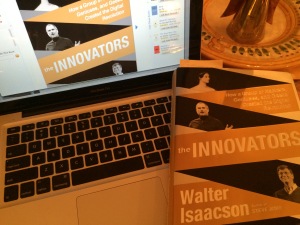 Anyone who regularly reads book reviews and keeps current on the rapidly evolving technology world is likely to have heard of a newly published book by Walter Isaacson, the famed author of Steve Jobs’ biography and president of the public policy think-thank, The Aspen Institute.
Anyone who regularly reads book reviews and keeps current on the rapidly evolving technology world is likely to have heard of a newly published book by Walter Isaacson, the famed author of Steve Jobs’ biography and president of the public policy think-thank, The Aspen Institute.
In fact, Isaacson’s new book has been reviewed by a countless number of publications, garnering significant attention and accolades – and it’s not difficult to understand why.
Entitled “The Innovators: How a Group of Hackers, Geniuses, and Geeks Created the Digital Revolution” (October 2014), it is Isaacson’s first book that profiles not one, but multiple people, who throughout history have contributed to the technological wonders of today – namely, the computer and the internet.
Named one of Amazon’s 2014 Best Books of the Year (#18) and ranking number 11 in the 2014 National Book Awards Longlist, it offers a fascinating exploration into the minds, personalities and creative spirit of technological innovators, beginning with Ada Lovelace – Lord Byron’s daughter – who pioneered computer programming in the 1840s. Moving on to later, perhaps more well-established figures – including Vannevar Bush, Alan Turing, John von Neumann, J.C.R. Licklider, Doug Engelbart, Robert Noyce, Bill Gates, Steve Wozniak, Steve Jobs, Tim Berners-Lee and Larry Page – Isaacson shows how it was the collaborative effort of many minds and geniuses who transformed our world with the creation of a digital revolution.
For further insight and a sampling of the reviews, please see below:
- “The Women Tech Forgot” (New York Times, reviewed by Nick Bilton, October 1, 2014):
“In many respects, the book could have been called ‘The Collaborators.’ Each chapter reinforces the core premise that Mr. Isaacson made after 15 years of research: That every technology innovation, whether programming code, transistors, personal computers or the Internet, was built by groups of people (usually by borrowing from past ideas).” …
“Ms. Lovelace’s role in tech for example, is so paramount that her story is the opening and closing chapter. An English mathematician and writer, she wrote the first-ever computer algorithm, put forth the idea that humanities and technology should coexist and dreamed up the concept of artificial intelligence.”
- “Geek Squad” (New York Times, reviewed by Brendan Koerner, October 2, 2014):
“Stubbornness is just one of the personality traits ubiquitous among the brilliant subjects of ‘The Innovators.’ Isaacson identifies several other virtues that were essential to his geeky heroes’ success…[t]he digital pioneers all loathed authority, embraced collaboration and prized art as much as science.” …
“Few authors are more adept at translating technical jargon into graceful prose, or at illustrating how hubris and greed can cause geniuses to lose their way.”
- “Heralds of the Digital Tomorrow” (New York Times, reviewed by Janet Maslin, October 8, 2014):
“Ada Lovelace’s mid-19 century writings were so brilliantly visionary about the potential of a general-purpose computer that she is acknowledged as a major-tech-world hero.” …
“The United States Defense Department named a computer language after her. There is an Ada Lovelace Day in Oct, a nifty Ada Lovelace Google Doodle and many books about her, including Ada’s Algorithom, a new biography by James Essinger.”
- Kirkus Reviews* of The Innovators:
“Isaacson reiterates one theme: Innovation results from both “creative inventors” and “an evolutionary process that occurs when ideas, concepts, technologies, and engineering methods ripen together.”
“Isaacson weaves prodigious research and deftly crafted anecdotes into a vigorous, gripping narrative about the visionaries whose imaginations and zeal continue to transform our lives.”
*Kirkus Reviews is an American book review magazine founded in 1933.
For more reviews, please visit the below links:
- Wall Street Journal; reviewed by Steven Shapin, October 3, 2014
- Washington Post; reviewed by Matthew Wisnioski, October 3, 2014
- Bloomberg Businessweek; reviewed by John Homans, October 2, 2014
- Financial Times; reviewed by Richard Waters, October 10, 2014
- Boston Globe; reviewed by Charles Euchner, October 21, 2014